
Journal of Cognition and Culture
Scope & Guideline
Advancing Understanding of Culture Through Cognitive Lenses
Introduction
Aims and Scopes
- Cognitive Science and Cultural Interaction:
The journal focuses on understanding how cognitive processes are shaped by cultural contexts, examining how culture influences cognition and vice versa. - Cross-Cultural Studies:
A core area of research involves comparative studies across different cultures, providing insights into how cultural variations affect cognitive functions, beliefs, and behaviors. - Religious Cognition:
The journal frequently publishes work that investigates the cognitive aspects of religious beliefs and practices, exploring how religion influences moral reasoning, social behaviors, and group dynamics. - Evolutionary Perspectives on Culture:
The journal emphasizes evolutionary approaches to cultural phenomena, analyzing how cultural practices may have evolved and their implications for human cognition. - Psychological Mechanisms in Cultural Transmission:
Research often addresses the psychological mechanisms behind cultural transmission, including how knowledge, beliefs, and practices are passed down through generations.
Trending and Emerging
- Gender and Cultural Cognition:
Recent studies increasingly address the intersections of gender and cognition, particularly how cultural factors perpetuate gender inequalities, reflecting a growing awareness of social justice issues within cognitive research. - Cognitive Neuroscience and Culture:
There is a rising trend in exploring the neuropsychological underpinnings of cultural practices, indicating a blending of cognitive neuroscience with cultural studies to better understand complex human behaviors. - Empirical Aesthetics and Culture:
The journal is seeing an increase in research related to aesthetics and cultural expressions, particularly how cultural backgrounds influence aesthetic judgments and preferences. - Moral and Ethical Decision-Making:
Emerging themes focus on how cultural contexts shape moral reasoning and ethical decision-making, particularly in cross-cultural comparisons, reflecting a broader interest in morality within cognitive science. - Impact of Technology on Cognition and Culture:
Recent publications explore the effects of technology on cognitive processes and cultural change, emphasizing how digital advancements alter traditional cultural practices and cognition.
Declining or Waning
- Traditional Cultural Norms:
There has been a noticeable decrease in studies focusing solely on traditional cultural norms without integrating cognitive or psychological frameworks, suggesting a shift towards more interdisciplinary approaches. - Static Models of Cultural Evolution:
Research employing static or unidimensional models of cultural evolution has become less common, as scholars increasingly favor dynamic and integrative models that account for cognitive processes. - Historical Cultural Studies:
Papers that focus primarily on historical accounts of culture without a cognitive or psychological angle are appearing less frequently, indicating a move towards more contemporary and empirically driven research.
Similar Journals
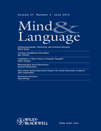
MIND & LANGUAGE
Unraveling the Complexities of Cognition and CommunicationMIND & LANGUAGE, published by WILEY, is a premier academic journal that has established itself as a leading platform for interdisciplinary research at the intersection of linguistics, philosophy, and cognitive science. With a noteworthy impact factor and a remarkable ranking in the top quartiles (Q1) for both Linguistics and Language as well as Philosophy, it reflects the journal’s robust contribution to the academic community, garnering attention from researchers and scholars worldwide. Since its inception in 1986, MIND & LANGUAGE has provided an avenue for exploring the complexities of language perception, cognitive processes, and the philosophical implications of linguistic studies. Its comprehensive scope ensures that it remains a critical resource for professionals and students alike who are engaged in the exploration of language's role in human thought and society. The journal's rigorous peer-review process guarantees the high quality and scholarly integrity of the published work, making it an essential addition to any academic library.
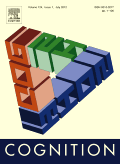
Cognition
Pioneering Research in Cognitive Processes and BehaviorCognition, published by Elsevier, is a leading journal dedicated to the exploration and advancement of knowledge in the multifaceted fields of cognitive neuroscience, cognitive psychology, and linguistics. Since its inception in 1972, this prestigious journal has established itself as a prominent platform for disseminating innovative research and critical reviews, achieving a remarkable Q1 ranking across various relevant categories, including Cognitive Neuroscience and Developmental Psychology, as per the 2023 metrics. With a focus on providing insights that are vital for researchers, professionals, and students alike, Cognition boasts an impressive standing in the academic community, evidenced by its high Scopus rankings which place it in the top percentiles in several disciplines. Researchers interested in the cognitive processes underlying human thought, language, and behavior will find Cognition an invaluable resource that publishes cutting-edge findings and fosters interdisciplinary collaboration. Though it operates under a traditional access model, the breadth and depth of its content ensure it remains integral to advancing cognitive science.
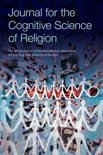
Journal for the Cognitive Science of Religion
Bridging Disciplines: Where Cognitive Science Meets ReligionJournal for the Cognitive Science of Religion, published by EQUINOX PUBLISHING LTD, serves as a key platform for interdisciplinary scholarship at the intersection of cognitive science and religious studies. With an ISSN of 2049-7555 and an E-ISSN of 2049-7563, this journal emphasizes empirical research and theoretical advancements that illuminate the cognitive mechanisms underlying religious thought and behavior. Despite its relatively recent establishment, the journal has already achieved notable rankings, including a Q1 placement in Religious Studies and commendable positions within the cognitive neuroscience and psychology categories. This underscores its importance in facilitating high-quality discourse and innovative research. Researchers and students are encouraged to explore the journal's contributions as it seeks to broaden our understanding of religion through cognitive lenses, while addressing contemporary issues and theoretical debates in this rapidly evolving field. The journal is accessible to a global audience, dedicated to fostering an inclusive environment for inquiry and knowledge dissemination in the study of religion.
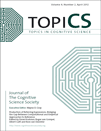
Topics in Cognitive Science
Exploring the Intersection of Mind and TechnologyTopics in Cognitive Science, published by WILEY, is a premier interdisciplinary journal that advances the understanding of the cognitive processes that underpin human behavior and interaction with technology. With a commendable impact factor and a strong focus on research from 2009 to 2024, this journal garners significant attention in various subfields, as evidenced by its Q1 ranking in Experimental and Cognitive Psychology and Linguistics and Language, alongside a Q2 position in Artificial Intelligence, Cognitive Neuroscience, and Human-Computer Interaction. Researchers and professionals will find invaluable insights into the latest experimental findings, theoretical discussions, and practical applications that bridge cognitive neuroscience, psychology, and computer science. Topics in Cognitive Science is especially pivotal for those aiming to delve deeper into cognitive mechanisms and their implications within our increasingly digital world, making it an essential resource for students and scholars alike.
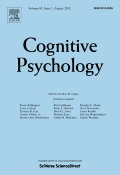
COGNITIVE PSYCHOLOGY
Exploring the Depths of Human CognitionCOGNITIVE PSYCHOLOGY is a premier academic journal published by Academic Press Inc. Elsevier Science, specializing in the dynamic and evolving field of cognitive psychology. With a significant history spanning from 1970 to 2024, this journal has established itself as a critical resource for researchers and professionals alike, boasting a distinguished ranking in the Q1 category across multiple disciplines, including Experimental and Cognitive Psychology, Neuropsychology, and Artificial Intelligence. Its impact factor, reflective of its influence and reputation within the academic community, positions COGNITIVE PSYCHOLOGY as an essential platform for disseminating cutting-edge research and theoretical advancements. Although it is not open access, subscribers gain exclusive insights into the latest findings that drive the field forward. The journal's commitment to fostering innovative research makes it an indispensable tool for those dedicated to understanding the complexities of human cognition.

MEMORY & COGNITION
Where Memory Meets Cognitive ScienceMEMORY & COGNITION is a premier journal published by SPRINGER, dedicated to advancing the understanding of cognitive processes related to memory. Established in 1973, this esteemed journal covers a wide range of topics within the fields of experimental and cognitive psychology, neuropsychology, and physiological psychology, cementing its status as a leading voice in the arts and humanities. With an impressive impact factor and a consistent Q1 ranking across multiple categories, MEMORY & COGNITION attracts high-quality research that elucidates the intricacies of memory function and cognition. The journal is nestled within the competitive landscape of academic publishing in the United States and maintains robust accessibility options, inviting both quantitative and qualitative analyses from researchers, professionals, and students alike. By fostering interdisciplinary dialogue and collaboration, this journal plays a pivotal role in shaping the future of cognitive research, making it an invaluable resource for its readership.

JOURNAL OF EXPERIMENTAL PSYCHOLOGY-APPLIED
Catalyzing Change through Empirical ExplorationThe JOURNAL OF EXPERIMENTAL PSYCHOLOGY-APPLIED, published by the American Psychological Association, is a premier outlet for cutting-edge research in the field of Experimental and Cognitive Psychology. With an impressive impact factor indicated by its Q1 ranking in 2023, this journal stands as a leading resource for scholars and practitioners, fostering a deeper understanding of the applications of psychological principles. With its extensive coverage from 1995 to 2024, the journal delivers a wealth of empirical studies, theoretical discussions, and methodological innovations that inform both academic learning and practical implementations in psychology. Although the journal does not offer open access options, researchers can gain insights into its influential findings through libraries or institutional subscriptions. Located in Washington, DC, it serves as a critical platform for disseminating high-quality research that bridges the gap between theory and real-world applications, supporting the advancement of knowledge in the vital area of human cognition and behavior.
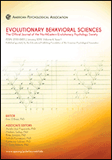
Evolutionary Behavioral Sciences
Advancing Knowledge at the Intersection of Evolution and PsychologyEvolutionary Behavioral Sciences, an esteemed journal published by the American Psychological Association, offers a compelling platform for researchers and professionals engaged in the fields of Experimental and Cognitive Psychology and Social Psychology. With an ISSN of 2330-2925, this journal has been a vital resource since its inception in 2014, aiming to bridge the gap between evolutionary theory and behavioral science, thereby fostering an interdisciplinary dialogue among scholars. Despite its current Q3 ranking in both relevant categories, it is poised for growth and increased visibility within the academic community, addressing contemporary issues through rigorous empirical research and theoretical advancements. Access to the journal is restricted, which bolsters its scholarly integrity, while its publication from one of the leading psychological associations signifies its commitment to excellence in behavioral research. Through the convergence of innovative studies and evolving methodologies, Evolutionary Behavioral Sciences underscores the importance of understanding human behavior from an evolutionary perspective, making it an essential read for anyone interested in the dynamics of behavior, cognition, and social interaction.
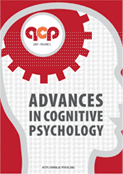
Advances in Cognitive Psychology
Bridging Theory and Practice in Cognitive ScienceAdvances in Cognitive Psychology is a premier peer-reviewed journal published by UNIV ECONOMICS & HUMAN SCIENCES WARSAW, dedicated to the exploration of psychological processes underlying cognition. With its open access model implemented since 2005, the journal facilitates wide-ranging dissemination of cutting-edge research across various branches of psychology, including applied, clinical, experimental, and cognitive psychology. Despite its modest standing in terms of impact factor, reflected in its Q3 and Q4 rankings across numerous subfields, it remains an important platform for emerging researchers and seasoned professionals alike, aiming to foster insight into complex mental processes and enhance understanding of behavioral patterns. The journal's commitment to accessibility empowers a diverse community of readers, including students, to engage with innovative studies and reviews, contributing to the collective knowledge within the psychological sciences. Located in Poland, Advances in Cognitive Psychology is open for submissions from worldwide researchers, encouraging a global perspective on cognition and behavior.
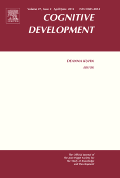
COGNITIVE DEVELOPMENT
Bridging Theory and Practice in Cognitive StudiesCognitive Development is a prestigious academic journal published by Elsevier Science Inc, focusing on the critical area of developmental and cognitive psychology. With an ISSN of 0885-2014 and an E-ISSN of 1879-226X, this journal serves as a vital platform for the dissemination of innovative research, theories, and methodologies from 1986 to the present, with the latest articles contributing to a comprehensive understanding of cognitive processes in children and adolescents. Positioned in the second quartile (Q2) of both the Developmental and Educational Psychology and Experimental and Cognitive Psychology categories, Cognitive Development holds an essential place in shaping contemporary psychological research, boasting robust Scopus rankings of #175/360 and #90/165 in its respective fields. Though not an open-access journal, it provides valuable insights and rigorous studies essential for researchers, professionals, and students engaged in the intricate processes of cognitive development. Whether you're looking to publish significant findings or simply stay updated on the latest advancements, Cognitive Development is an indispensable resource in the psychological community.